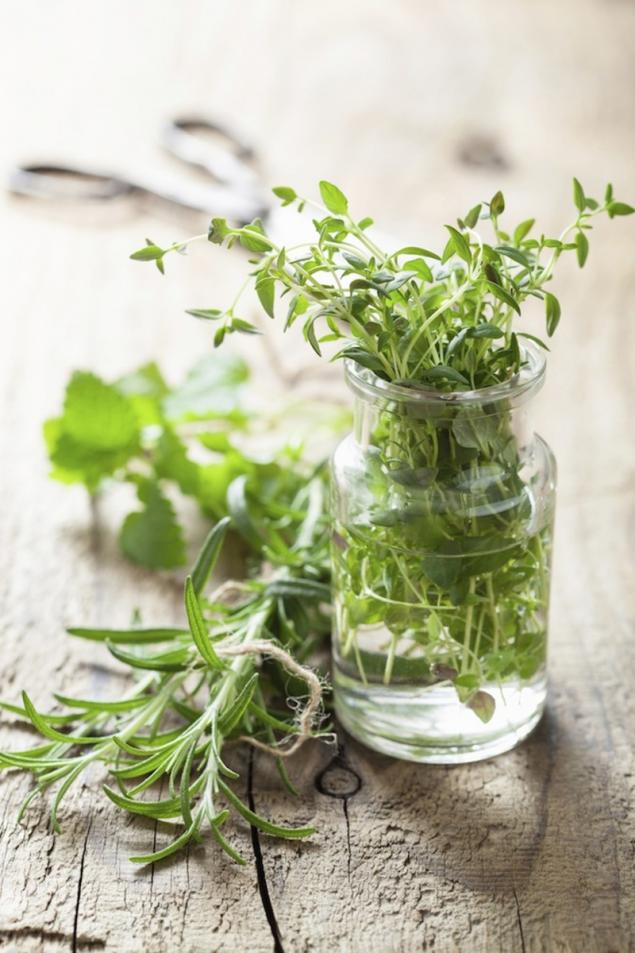472
Thyme in medicine and healthy nutrition

Thyme is known by the presence of numerous useful phytonutrients, minerals and vitamins needed for good health. He ranks among the most popular cooking herbs. It was originally native to southern Europe and the Mediterranean. The most widely common thyme, also known as French thyme.
The plant thyme (thyme) is a perennial green plant of wood based panels with square stems. In length it reaches 15 to 30 centimeters, it is noted on the resource Nutrition And You gathered a lot of interesting information about this fragrant greenery. It has a very small light green fragrant soft leaves below. In summer the plant blooms, its white or purple flowers small and fragrant.
The most common varieties of thyme — lemon, caraway and wild thyme. The leaves of each of these varieties are used in cooking fresh or dried.
Of course, any information about the properties of food products play only an informative role. On any, even the most wholesome foods can be individual allergic reactions. Therefore, in all cases relating to diet and health, you should consult a doctor.
The use of thyme for zdorovaia contains a plurality of active particles, having the properties of prevention of diseases and support health.
The herb thyme contains thymol, one of the most important essential oils. Scientists have discovered the antiseptic and antifungal properties of thymol. Contains thyme and other essential oils, carvacrol, borneol and geraniol.
Thyme also contains many flavonoid phenolic antioxidants, including zeaxanthin, lutein, apigenin, naringenin, luteolin. Fresh thyme contains the highest amount of antioxidants among all herbs, having among them the highest antioxidant level. Total ORAC (Oxygen Radical Absorbance Capacity, adsorption capacity with respect to oxygen radicals) is 27,426-µmol TE/100 grams.
Thyme is full of minerals and vitamins needed to maintain health in optimal condition. Its leaves are one of the richest sources of potassium, iron, calcium, manganese, magnesium, and selenium. Potassium is an important component fluids of the cells and organism, helps control heart rate and blood pressure. Manganese acts as a contributing factor to the enzyme-antioxidant called superoxide dismutase. Iron is essential for the formation of red blood cells.
The greens are also rich in important B vitamins, beta-carotene, vitamins A, K, E, and folic acid.
Thyme contains 0.35 milligrams of vitamin B6 (pyridoxine), providing 27% of the recommended daily allowance. Pyridoxine also supports the level of gamma-aminobutyric acid (GABA) in the brain. This acid acts as an important neurotransmitter, which reduces the level of stress.
Vitamin C helps the human body to resist pathogens infection and cleans it from harmful, contributing to inflammation, free radicals.
Vitamin a refers to the fat-soluble vitamins acting as antioxidants that support healthy skin and mucous membranes. It is also important for vision. Eating natural foods rich in both flavonoids and vitamin a and beta-carotene help to prevent cancer of the gums and mouth.
Thyme does not contain cholesterol.
The choice of thyme when buying and granniesfree and dried thyme you can buy in the store. Fresh thyme is preferable, because it is incredibly nutrient-rich, distinctive full-bodied taste. The leaves of fresh thyme should be light green and not to contain any dark spots and yellowing.
Fresh thyme should be stored in the fridge, not wrapped too tightly in paper towel. Dried thyme should be stored in tightly closed glass container in a cool, dark and dry place. Thus he will remain a maximum of six months.
The use of thyme in kulinarischen thyme has a rich aroma, so it should be added to food in very small quantities. To aroma thyme preserved, herbs are added to food in the last minute of cooking. The fact that long heating of thyme leads to the evaporation of the contained essential oils.
Tea made from the herb thyme is a popular drink.
Thyme is used in soups and sauces.
The thyme is part of bouquet Garni (bundle of herbs or spices), along with the Bay leaf, parsley and celery.
Thyme along with other spices used in the marinating and stuffing chicken, fish and meat.
The use of medicineman thyme contains many important essential oils, having, as it was discovered, antiseptic and antifungal properties.
Gargling with tepid thyme water extract or drink it in small SIPS may help alleviate cough, sore throat and symptoms of bronchitis.
In the pharmaceutical industry recipes on the basis of the thyme produced in the form of antiseptic compositions for rinsing the mouth dental caries, inflammation of gums.
Nutritional value timenav parentheses are the percentage of the daily allowance. Nutritional value is based on 100 grams fresh thyme leaves, according to information from the Ministry of agriculture of the United States.
General information:
energy value 101 kcal (5%);
carbohydrates 24.45 grams (18%);
protein — 5.56 grams (10%);
fats — 1.68 grams (10%);
cholesterol — 0 milligrams (0%);
fiber, part of the food — 14,0 grams (37%).
Vitamins:
folate — 45 micrograms (11%);
nicotinic acid — 1,824 milligrams (11%);
Pantothenic acid — 0,409 milligrams (8%);
pyridoxine (vitamin B6) — 0,348 milligrams (27%);
Riboflavin (vitamin B2) — 0,471 milligrams (36%);
thiamine (vitamin B1) — 0.48 mg (4%);
vitamin A — 4751 international units (IU, IU) is 158%;
vitamin C — 160,1 milligrams (266%).
Electrolytes:
sodium — 9 mg (0,5%);
potassium 609 mg (13%).
Minerals:
calcium 405 mg (40.5 per cent);
iron 17.45 mg (218%);
magnesium — 160 mg (40%);
manganese — 1,719 milligrams (75%);
zinc — 1.81 milligrams (16.5 per cent).
Phytonutrients:
beta-carotene (ß-carotene), which is rich in carrots — 2851 micrograms.
But even knowing about such useful qualities, many will agree to replace your favorite coffee with an infusion of thyme?
Source: hi-news.ru























